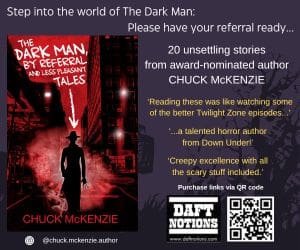The Horror Tree Presents…. An Interview with Noel Osualdini
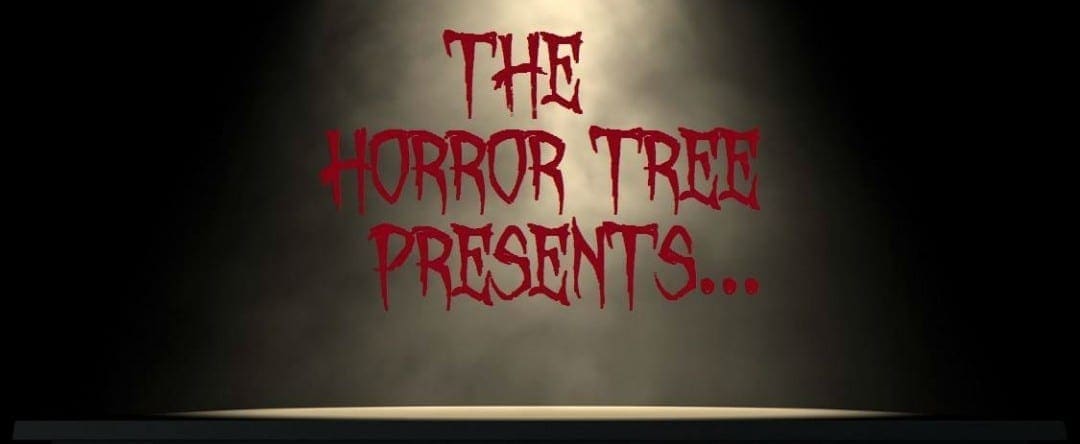
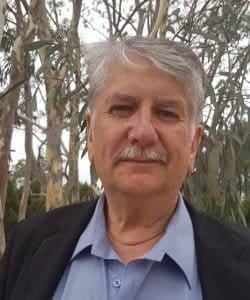 Ruschelle: Nice to meet you Noel and welcome to the Horror Tree. I put on a pot of tea so pull up a floofy chair, grab your favorite Muse- preferably the one less likely to draw blood (the last muse that sat in with me in a Horror Tree interview was a biter) and let’s chat.
Ruschelle: Nice to meet you Noel and welcome to the Horror Tree. I put on a pot of tea so pull up a floofy chair, grab your favorite Muse- preferably the one less likely to draw blood (the last muse that sat in with me in a Horror Tree interview was a biter) and let’s chat.
Speaking of Muses, tell us a little about yours. Is she our ever present? Does she speak to you only when it’s dark and the world around you is quiet? And most importantly…is she hot?
Noel: After Halloween we had so many mannequins and skeletons and animated monsters that I dragged them all into the garage afterwards, and they’re all still crowded around the door of my office. Every so often the wind or a cat or a passing spirit will trigger one, and the cackle of a witch or the groan of a zombie will freak me out while I’m alone writing in the middle of the night. While that’s quite inspirational—and rather chilling—I don’t know that I have a particular Muse. I do have a partner, Joanne (yep, she’s hot), and a big family who I love. One of my workshop buddies, EJ McLaughlin, once commented that I write families very well, “probably because you’re a family man and your stories show how much you love your family”. So I guess that’s the closest I come to having a Muse.
Ruschelle: If you had to make an educated guess, or maybe you know the exact number- how many short stories have you written?
Noel: I couldn’t be sure. I started writing as a boy, though I didn’t finish a lot of what I started; education, life on my parents’ farm, and later “real” work at a TV station and in various offices, got in the way for a long time. Also, I used what spare time I could find to read. I wrote a lot of non-fiction for staff magazines, newsletters and brochures while I worked in the public service, as well as a number of unpublished stories and two failed novels. In the last five or six years, though, I have probably written dozens of stories. Some were real stinkers, but a fair degree of the good stuff is in Train Wreck and Other Stories, and a few of my tales are still waiting to find a home.
Ruschelle: You have a slew of short stories in various anthologies. Do you write to the theme of the anthology submission call or do you write and scour though your precious bits for the perfect story you’ve penned to meet the theme?
Noel: I’ve done both, though often I find myself looking through submission calls for inspiration. Sometimes I’ve just been lucky: I wrote Night Escape, for example, in an afternoon in 2013, and it received an honorable mention in the annual flash fiction competition run by the Australian Horror Writers’ Association; but I had no idea what to do with a story of 995 words until I discovered HorrorTree and found the submission call for 100 Doors to Madness. Similarly, my story Writer’s Retreat, which was accepted by non-theme anthology Fear’s Accomplice and later was a perfect fit for The Twilight Madhouse. The problem with writing without a guiding submission call is that what you’ve written (like my as-yet unpublished Something Went Bump in the Night) might never find a suitable home.
Writing to a theme is easier, and I’ve had more success when I’ve targeted proposed anthologies on, say, mutants (for example, Outback Attack, which has one of the strongest openings and perhaps the silliest ending I’ve ever done) or deep-sea horror (as in my story for the unpronounceable Anenome Enemy). The problem with writing specifically for a particular anthology is that if your story isn’t accepted, you might find yourself stuck with something that never sees the light of publication because there happen to be fifty other writers of rejected stories about hybrid dog monsters trying to get published.
Ruschelle: Of all the stories crawling through each dark and creepy anthology, which one scares you the most?
Noel: I think perhaps The Ghost in the Water, the first story I wrote for the shared universe anthology The Refuge Collection. It may sound clichéd, but I think the combination of a young woman in a strange town, creepy characters from other stories in the collection, and something evil lurking in the background, make for a terrifying story. I became so attached to the main character, Shauna, that I continued her story in volume two of the collection with The Undertaker’s Tale, and then wrote a third story without any hope of publication (although it’s included in Train Wreck and Other Stories).
Ruschelle: Your story, Call Center, in your debut collection, Train Wreck and Other Stories, is about a hellish job at…well…a call center. That’s scary in itself! How much of the “conflicts” and dialogue snippets did you pull from real life? I’ve worked at a call center. I’ve experienced the sharp tongue and dull wit from the raised voices on the other end of the line?
Noel: To the uninitiated, sitting at a desk and taking customer calls all day must sound like a very easy way of making a living. The truth is that a constant barrage of complaints, demands and abuse from customers, as well as management insistence that call times be kept to a minimum, can grind you down, and customer service staff often burn out and leave within months. Although there are a couple of things in this story that didn’t happen to me personally, I drew most of it from my own experience working in the call center of a very big power company.
Margaret, the team leader who tells David Perry off for a long call, is based on two particular people I knew. I really did get a complaint call from an actor who, oddly, also turned up at the garage where I currently work to complain about something else. I really did speak to a Henry Lawson, and to a man called James Joyce (one of the real-life Margarets didn’t know who James Joyce was, or why I was so impressed; incidentally, although not in this story, I also spoke to a Ronald McDonald and a Bill Gates, both on the same day, during a phone campaign at a previous job). The misspelling of the abbreviation for CUSTOMER in a computerised note was from another company, and the customer service rep who’d made the mistake unfortunately found he could neither correct nor delete it. The personal threat to Stan Wood actually was made by somebody from interstate who ended the call with “I know where you work”, and the story of the man whose car was blown up by an angry customer came from a friend who’d been working in social security at the time.
Terry Russell, the villain of the story, was based on a customer who rang me on numerous occasions to complain that his bill was incorrect; each time I made an appointment for a technician to reread his meter, though, his gate would be locked and I’d get another call. Eventually I suspected he was trying to drive me to insanity, and, like David Perry, I refused to speak to him. I didn’t take the solution that David eventually takes—the building I’d worked in had an outside break area that would have been perfect for a jump—but I did almost ditch the whole story when I learned that an operator at another company committed suicide when management casually raised sales targets to a virtually impossible, but “achievable”, level.
Ruschelle: How did you decide on the number of stories that would ultimately grace your collection?
Noel: Originally, I thought we’d just dump all of my stories into the book in order of publication, starting with a 55-word piece I’d written for a readers’ column in a Melbourne newspaper, The Herald Sun (I was so stressed from call center work at the time that I misjudged my speed on a wet road and crashed my car on the way to post it). I really like the discipline of writing very short stories to an exact word count, but Steve Dillon, the editor, suggested we take out several smaller pieces. He also suggested removing a zombie tale he didn’t think was good enough, and that we rearrange the stories. He rang me one day to say that he’d enjoyed Call Center so much that he thought it should be the first story in the collection.
Ruschelle: I agree with Steve. The Call Center story was awesome. Call center are a little piece of true Hell. Soooo… what is it about the art of the short story that keeps you writing them?
Noel: A short story is like an intense rush of experience, and some of my favourite writers—Charles Bukowski, Ray Bradbury, and Steven King, for example—have worked in the short form. Sometimes, as with Night Escape, a draft can be written in a furious hour or two. I wrote The Undertaker’s Tale at breakneck speed in just two days, and it was accepted for publication with only a couple of minor changes the day after I started writing; the sense of achievement was incredible. I’ve written longer pieces—I have a novella, for example, that I’ve been working on for some years—but shift work, family, and so many other distractions have kept me from concentrating on a single, long story.
Ruschelle: The stories that appear in your collection run that gamut, cannibals, a vengeful spirit and worse….a cheating husband. How did you choose each story in your collection…or did they choose you?
Noel: Sometimes it seems the story chooses the writer, like Harry Potter’s wand. Cannibals, ghosts and monsters are the stuff of nightmares, and nightmares are the stuff of horror stories. The cheating husband certainly gets what’s coming to him, and more—as a counterbalance, the main character in one of my unpublished stories (not included in this book) is a loyal and loving husband who is very concerned when he wakes in the middle of the night to find his wife missing.
I was thinking about it one day and realized how many times ghosts appear in my stories. Perhaps that’s partly the influence of my mother, who told me about some personal experiences. Partly it’s also due to the influence of one of my great grandmothers, who allegedly had been involved with a spiritualist church and owned a ouija board; she passed away when I was 15 and I’ve only seen her since in a single dream where she came to ferry me to the afterworld; of course, in real life sweet little old ladies like my nanna are always just sweet little old ladies, like the women in No More Fly Eyes or A House Returned.
Ruschelle: Many of us writers have a story on our laptop that just refuses to grow up and become a ‘real boy.’ Do you have a story that you really want to finish but it just vexes you?
Noel: Several. There’s the story of a would-be art historian working as a teacher; I started writing the story years ago—and restarted, and started again—and my frustration at never being able to find enough time for it was one of the several reasons I left my job at the call center. Eventually it grew from a simple short story of 6,000 words to a novella of 25,000 words, and I’m still not happy with it. It could even have the makings of a novel, but I suspect it might be one of those stories that just hangs around, never to be completely finished.
Ruschelle: You are lucky to belong to a group of writers who get together and do…..writing stuff. I’m envious! Okay, tell us all a little of what your awesome group of authors do at these super clandestine , super secret meetings?
Noel: I just can’t talk too highly of writers’ workshops. It’s one thing to have friends and relatives read your work, but I’d encourage anyone who’s serious about being a writer to find a like-minded group of creative people to bounce ideas off. I was lucky enough to be invited to join the Dark Fiction Writers’ Circle by its founder, a brilliant man called Davidh Digman, who I knew from my days as a consultant layout operator at a college newspaper. I was hooked from the first meeting. Generally, we read and critique each other’s writing, suggest changes, discuss books and ideas, and occasionally someone will come up with a writing exercise to challenge everyone’s creativity. My flash fiction piece A Taste for Salt, which will appear on Antipodean SF’s website in March 2019, originated with such a challenge (write about an issue, expressing a “love it” or “hate it” attitude—in my case, anchovies on pizza, love it, led me to write a short dystopian piece about salt being in short supply and affordable only by the rich).
That said, you need to be careful, too. I was lucky enough to get involved with a positive, creative group, and occasionally I wonder whether I would ever have been published at all without their support, their suggestions, and their criticism. Yet, we had to oust people along the way, too: people who weren’t the right fit, who lacked commitment or were overcritical. Though a couple of people from the original group are no longer able to come to the regular meetings, we continue to get together, six years after forming.
Ruschelle: While creeping on your Facebook page, I came across several mentions of killer critters that command your homeland. Do you keep any as pets?
Noel: So you’ve been stalking me, Ruschelle? Actually, thanks: I’ll tuck that away for another story. Australia has a lot of killer wildlife, such as crocodiles, sharks, aggressive kangaroos, platypus with poisonous barbs, some of the deadliest snakes in the world, dangerous spiders and the such, not to mention the legendary (and totally fabricated) drop bear. American crime writer Joe Clifford, who has remained in contact via Facebook ever since republishing my story Night Escape on his website, outofthegutteronline.com, once told me that he’d never visit Australia because of the deadly animals. Ever since then, I’ve made a point of posting stories and video clips of animal attacks (Hi, Joe, if you happen to be reading this).
We don’t get too many box jellyfish or taipan in the outer suburb of Melbourne where I live, but a friend confirmed there are red-bellied black snakes (listed as tenth-deadliest of Australia’s snakes) in the wetlands just down the street from her home. My father once shot a copperhead (number 7 on the list) on the family farm, and my mother used a shovel to beat a snake beyond recognition when I was a boy. My daughter even had a rabbit once that turned territorial and used to attack me every time it saw me (don’t underestimate bunny bites: those teeth are sharp enough to chomp through grass, leaves, and the skin on the back of your feet), but the deadliest monster in my house these days, apart from the occasional redback spider, is my cat Naruto, who leaves dead mice at the bottom of the stairs.
Ruschelle: Dead mice make a delicious appetizer. That What was the first real piece of writing advice you ever received that changed your writing world?
Noel: I really can’t recall. I do remember that during my final year of high school a teacher called me into his office about an essay I’d submitted, and asked whether I’d ever considered writing as a career.
Stephen King’s statement that you can’t be a writer if you aren’t a reader is true, but I think one of the best pieces of advice I ever heard was from the story of a famous writer who was giving a lecture to a group of hopefuls. He asked who among them wanted to write, and when all of the hands in the audience went up, he asked: “Then what are you doing here?” It made me realize that all the writing classes in the world, all the workshops and books about being a writer, won’t help unless you actually plant your bum on a seat in front of a desk and write. Or you can stand up and write, like Ernest Hemingway.
Ruschelle: Could you give your newfound fans a glimpse into your next projects?
Noel: One day, I’m going to finish that damned novella, I swear it. In the meantime, I have a very short story called A Taste For Salt coming out in March on the Antipodean SF website, and I’m collaborating with science fiction writer Michael Brand on a short story for an anthology. I do have something longer in mind as a future project, but at the moment it’s only a vague collection of ideas.
Ruschelle: Thank you for joining us here at The Horror Tree and letting us peek into your writing affairs…and your life! So where should your newfound fans hit you up and send you fan mail, delicious cakes and crisp 20 dollar bills?
Noel: Noel doesn’t have a website of his own, but he is on Facebook, and he’d love to hear from you. Some of the books and websites he mentions can be found by searching his name on amazon, google, or audible.com.
Train Wreck and Other Stories can be purchased via ebay at https://www.ebay.com/itm/Train-Wreck-and-Other-Stories-by-Noel-Osualdini/283311531402?fbclid=IwAR3x6NXsT7zhQwUGY6G3dryJ_aEJWjPO4ieciMZZz7Ryiw142yeC1d25P_k
Ruschelle: I love when authors talk in third person….and like pirates. Argggggg!

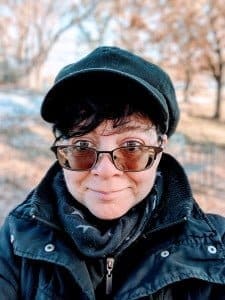

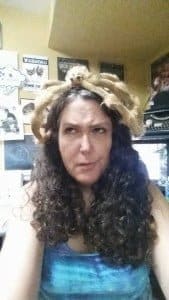 Ruschelle: It’s great to spend some time getting to know you. Especially, since it’s most Horror author’s favorite time of the year. So let’s explore that. What was your first Halloween memory, and did it shape and inspire your writing?
Ruschelle: It’s great to spend some time getting to know you. Especially, since it’s most Horror author’s favorite time of the year. So let’s explore that. What was your first Halloween memory, and did it shape and inspire your writing?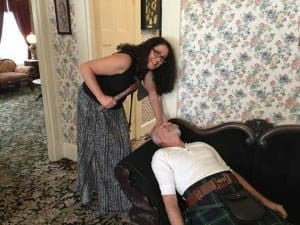 Ruschelle: Wonder Woman was created by her mother, Hippolyta, from nothing more than a lump of clay…and some love. And like Hippolyta, many authors are able to birth ideas from next to nothing, while others must seek out ideas and inspiration from outside stimuli? How are your stories birthed?
Ruschelle: Wonder Woman was created by her mother, Hippolyta, from nothing more than a lump of clay…and some love. And like Hippolyta, many authors are able to birth ideas from next to nothing, while others must seek out ideas and inspiration from outside stimuli? How are your stories birthed?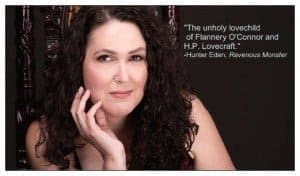 Ruschelle: You have been described as the unholy love child of Flannery O’Connor and H.P Lovecraft. That is a very interesting pairing. So…which do you resemble? Are you Cthulu-esque?
Ruschelle: You have been described as the unholy love child of Flannery O’Connor and H.P Lovecraft. That is a very interesting pairing. So…which do you resemble? Are you Cthulu-esque?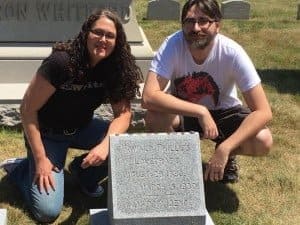 The closest that I’ve written to something that could be considered Lovecraftian would probably be The Answer Bell, a lovely tale where a local Nashville tourist spot rings out the end of the world.
The closest that I’ve written to something that could be considered Lovecraftian would probably be The Answer Bell, a lovely tale where a local Nashville tourist spot rings out the end of the world.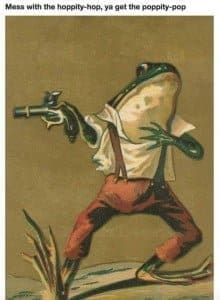 Ruschelle: I was stalking you on Twitter and I was drawn to your spirit animal. Tell us about the frog and how he guides you. It doesn’t look like guiding it’s more like demanding your presence. Is it because he’s “packing” and you feel you have to let him guide you? Are you afraid he may put a cap in your B-HIND? (Insert frog photo here)
Ruschelle: I was stalking you on Twitter and I was drawn to your spirit animal. Tell us about the frog and how he guides you. It doesn’t look like guiding it’s more like demanding your presence. Is it because he’s “packing” and you feel you have to let him guide you? Are you afraid he may put a cap in your B-HIND? (Insert frog photo here)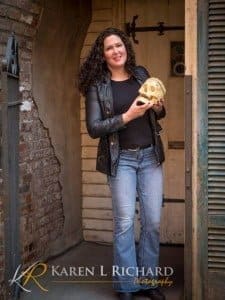 Ruschelle: Becoming a drunk does have its perks…Do you prefer to pen short stories or novels?
Ruschelle: Becoming a drunk does have its perks…Do you prefer to pen short stories or novels?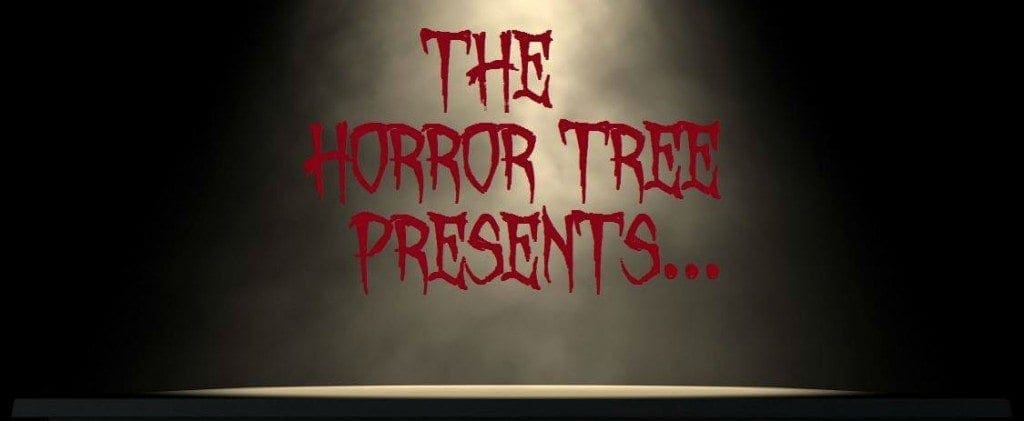
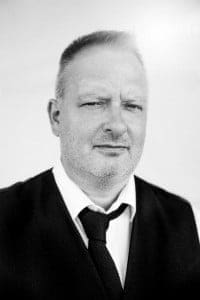 Ruschelle: Thank you for hanging out with us in our little piece of ‘Horrific Hell’ and giving us the opportunity to know the man of many talents. You’re an author an editor a director, filmmaker and Pinhead aficionado! Is there anything you don’t do?
Ruschelle: Thank you for hanging out with us in our little piece of ‘Horrific Hell’ and giving us the opportunity to know the man of many talents. You’re an author an editor a director, filmmaker and Pinhead aficionado! Is there anything you don’t do? 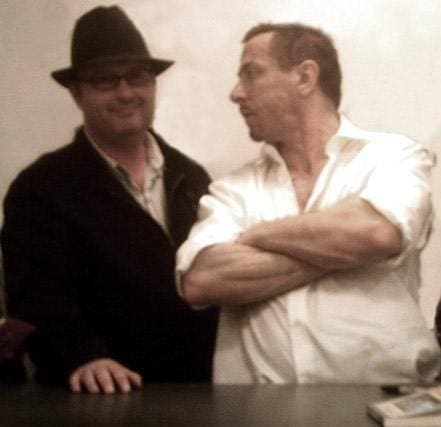 Ruschelle: You and I definitely have some “body part” issues (See BoneSai on Amazon. You need to help make it a musical Dean! LOL) But back to YOU… I read that you prefer to devour Clive Barker’s work than that of Stephen King’s. What makes Barker so much more…delicious?
Ruschelle: You and I definitely have some “body part” issues (See BoneSai on Amazon. You need to help make it a musical Dean! LOL) But back to YOU… I read that you prefer to devour Clive Barker’s work than that of Stephen King’s. What makes Barker so much more…delicious?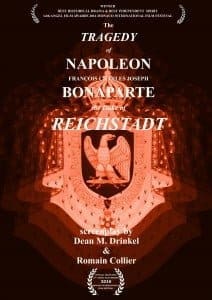 Ruschelle: You wrote a screenplay surrounding the life and death of the little dictator Napoleon Bonaparte and his son. Did you trick it out with beheadings, torture and sniffs of Hell? I’m…err asking for a friend…
Ruschelle: You wrote a screenplay surrounding the life and death of the little dictator Napoleon Bonaparte and his son. Did you trick it out with beheadings, torture and sniffs of Hell? I’m…err asking for a friend…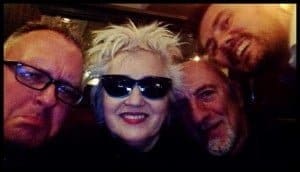 Ruschelle: You are the Associate Editor of Fear magazine. How does that particular hat fit on your head with all the others?
Ruschelle: You are the Associate Editor of Fear magazine. How does that particular hat fit on your head with all the others?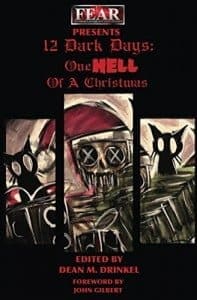 Ruschelle: Fear collaborated with NOCTURNICORN PRESS on the Christmas anthology, “12 Dark Days: One Hell Of A Christmas”. I’ve been lucky enough to have met a few of your talented authors, albeit via social media. How did you choose the talent that oozed from the pages? I also just like saying the word OOZED…
Ruschelle: Fear collaborated with NOCTURNICORN PRESS on the Christmas anthology, “12 Dark Days: One Hell Of A Christmas”. I’ve been lucky enough to have met a few of your talented authors, albeit via social media. How did you choose the talent that oozed from the pages? I also just like saying the word OOZED…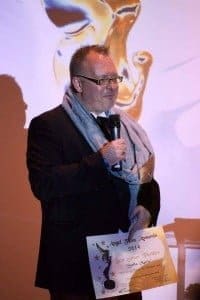 Ruschelle: You are a man of a few awards! Is there one award out there you are damned and determined to win?
Ruschelle: You are a man of a few awards! Is there one award out there you are damned and determined to win?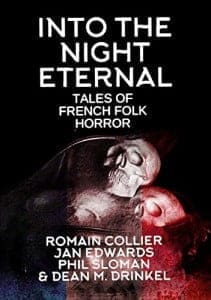 Ruschelle: Your newfound fans would love a glimpse into your next projects. What should we look for?
Ruschelle: Your newfound fans would love a glimpse into your next projects. What should we look for?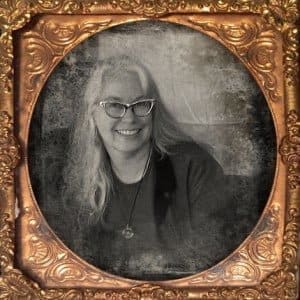 Ruschelle: Thank you so much for taking a break from haunting cemeteries to chat with us here at the Horror Tree. You are somewhat of a Taphophile as your books Wish You Were Here: Adventures in Cemetery Travel, 199 Cemeteries to See Before You Die as well as a myriad of other blogs, posts and essays on cemeteries you’ve written affirms. What continues to draw you to the granite and marble bones of our past?
Ruschelle: Thank you so much for taking a break from haunting cemeteries to chat with us here at the Horror Tree. You are somewhat of a Taphophile as your books Wish You Were Here: Adventures in Cemetery Travel, 199 Cemeteries to See Before You Die as well as a myriad of other blogs, posts and essays on cemeteries you’ve written affirms. What continues to draw you to the granite and marble bones of our past?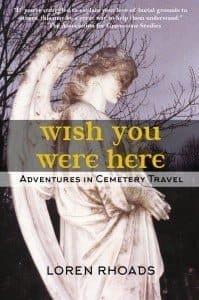 Ruschelle: You’ve been a member of the Association for Gravestone Studies for almost 20 years. Of all the sites you’ve visited, which one has made the biggest impression on you and your writing?
Ruschelle: You’ve been a member of the Association for Gravestone Studies for almost 20 years. Of all the sites you’ve visited, which one has made the biggest impression on you and your writing?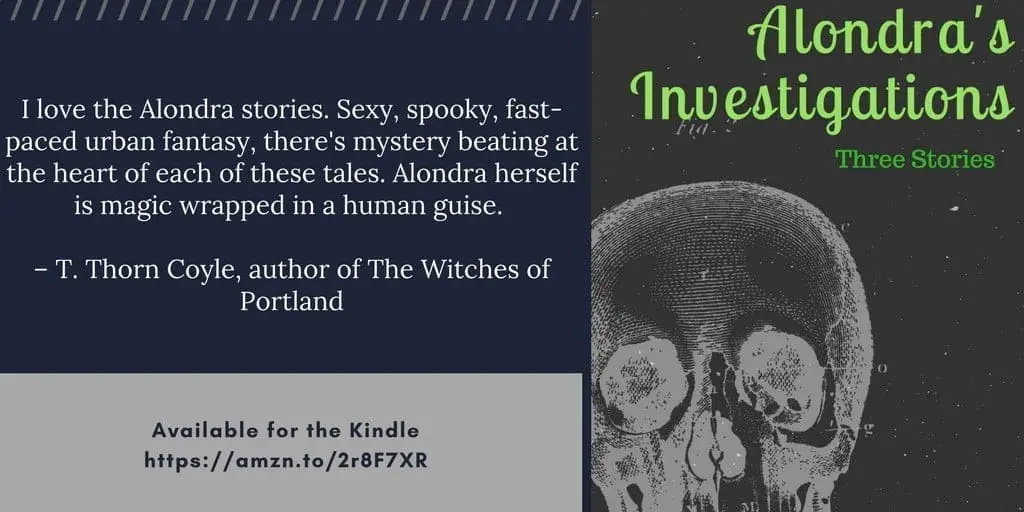
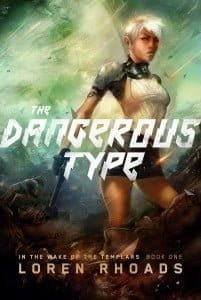 Ruschelle: Your Wake of the Templars Trilogy is Science Fiction! How do you go from terra firma to terra nova?
Ruschelle: Your Wake of the Templars Trilogy is Science Fiction! How do you go from terra firma to terra nova?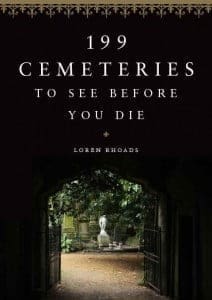 Ruschelle: Of everything you write and have written, what has been the most challenging?
Ruschelle: Of everything you write and have written, what has been the most challenging?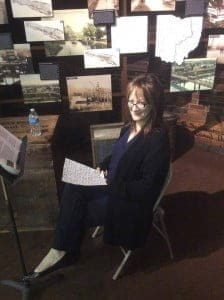 Ruschelle: Thank you for sitting down to share a little about yourself with us.
Ruschelle: Thank you for sitting down to share a little about yourself with us.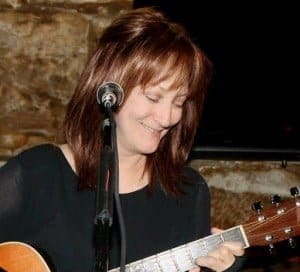 Ruschelle: Writing music is a different art form from writing books. Lyrically, one can be more cryptic and sentence structure isn’t always followed which can be very liberating. How do you tackle writing each art form?
Ruschelle: Writing music is a different art form from writing books. Lyrically, one can be more cryptic and sentence structure isn’t always followed which can be very liberating. How do you tackle writing each art form? Ruschelle: Thank you for taking the time to chat with us at the Horror Tree!
Ruschelle: Thank you for taking the time to chat with us at the Horror Tree!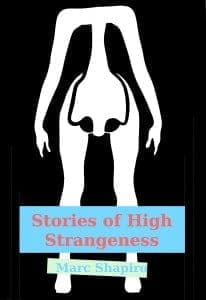 Marc: That’s a tough one because all my influences have long since gone to the great beyond. I’m old school. I firmly believe in one writer/one vision. If I could resurrect the dead we might be here all night. Charles Bukowski, Rod Serling, H.P. Lovecraft, Ray Bradbury any and all of the Beats. Those are my literary gods.
Marc: That’s a tough one because all my influences have long since gone to the great beyond. I’m old school. I firmly believe in one writer/one vision. If I could resurrect the dead we might be here all night. Charles Bukowski, Rod Serling, H.P. Lovecraft, Ray Bradbury any and all of the Beats. Those are my literary gods.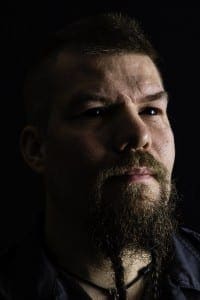 Ruschelle: Was there an event, movie book or supernatural experience that happened in your life when you knew you wanted to write in the horror genre?
Ruschelle: Was there an event, movie book or supernatural experience that happened in your life when you knew you wanted to write in the horror genre?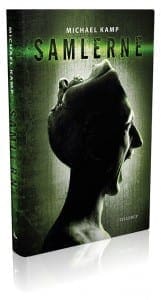 Michael: Yes. Most of my stories are part horror, part social commentary and since Danish and US societies are pretty different both in function and mindset, some of them don’t translate very well. For instance, my award-winner Samlerne (The Collectors) deal with the newly emerging role for fathers and men, where the main character feels adrift and has a hard time connecting with his family. He has to try and fix a dysfunctional marriage and be a positive role model for his children, who are slowly becoming strangers to him.
Michael: Yes. Most of my stories are part horror, part social commentary and since Danish and US societies are pretty different both in function and mindset, some of them don’t translate very well. For instance, my award-winner Samlerne (The Collectors) deal with the newly emerging role for fathers and men, where the main character feels adrift and has a hard time connecting with his family. He has to try and fix a dysfunctional marriage and be a positive role model for his children, who are slowly becoming strangers to him.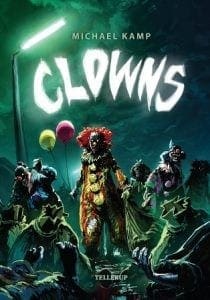 Michael: The easiest by far was Clowns. It took me a month because it mostly wrote itself. The premise was so simple. It was the height of the Scary Clown epidemic and we had tons of them in Denmark.
Michael: The easiest by far was Clowns. It took me a month because it mostly wrote itself. The premise was so simple. It was the height of the Scary Clown epidemic and we had tons of them in Denmark.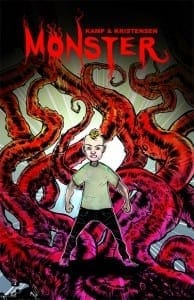 Michael: I had planned to put out two titles at the start of the year, but now it’s already April, so … Decay is translated and on its way and one of my YA titles have been planned, but I have not actually translated the bulk of the text yet.
Michael: I had planned to put out two titles at the start of the year, but now it’s already April, so … Decay is translated and on its way and one of my YA titles have been planned, but I have not actually translated the bulk of the text yet.